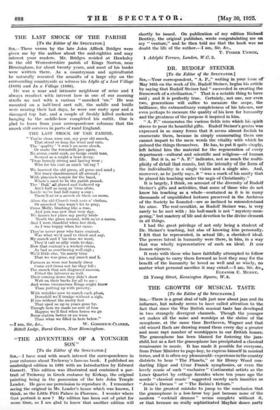DR. RUDOLF STEINER
[To the Editor of the SPECTATOR.] SIR,—Your correspondent, " A. P.," writing in your issue of May 16th on the work of Dr. Rudolf Steiner, begins his article by saying that Rudolf Steiner had " succeeded in creating the framework of a civilization." That is a notable thing to have said ; and it is perfectly true. Certainly, not one, nor even two, generations will suffice to measure the scope, the brilliance, the extraordinary completeness of his labours, nor even perhaps to measure the quality of his love for humanity and the greatness of the purpose it inspired in him.
" A. P." enumerates the various fields into which his spirit strove to pour its bountiful gifts. Rudolf Steiner's genius was expressed in so many forms that it seems almost foolish to enumerate them, because in simply enumerating them one cannot impart to the mere words the vitality with which he imbued the things themselves. He has, to put it quite simply, left behind him the material for the regeneration of every department—cultural and scientific and religious—of human life. But -it is, as " A. P." indicates, not so much the multi-
plieity of detail that counts, but the intensity of the focus of
the individuality in a single vision and a single aim. And, moreover, as he justly says, it " was a mark of his sanity that he placed his teaching under the aegis of Christianity."
It is largely, I think, on account of the diversity of Rudolf Steiner's gifts and activities, that some of those who do not know his teaching as a whole—contained as it is in many thousands of unpublished lectures preserved in the Archives of the Society he founded—are so inclined to misunderstand his aims. The real occultist, as Rudolf Steiner was, is very rarely to be met with ; his hall-mark is not " mystery-mon- gering," but mastery of life and devotion to the divine element in all things.
I had the great privilege of not only being a student of Dr. Steiner's teaching, but also of knowing him personally. I felt that he represented, in actual life, a cherished ideal. The powers latent in humanity were there, in him, in a way that was wholly representative of such an ideal. It was human ripeness.
It rests with those who have faithfully attempted to follow his teachings to carry them forward as best they may for the benefit of the humanity he loved so well and so wisely, no matter what personal sacrifice it may entail.—I am, Sir, &c.,.
ELEANOR C. MERRY.
23 Young Street, Kensington Square, W.8.










































 Previous page
Previous page